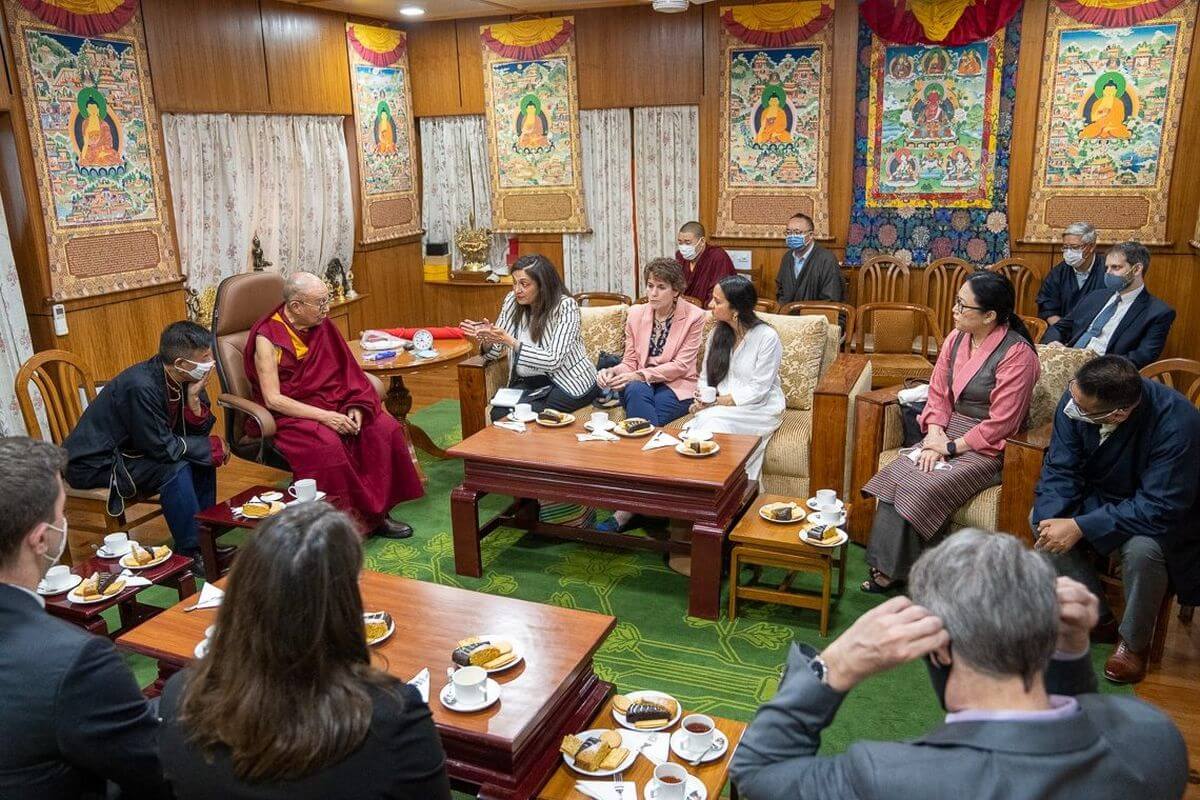Chinese Foreign Ministry spokesperson Zhao Lijian criticised the United States for sending Special Coordinator for Tibetan Issues Uzra Zeya to meet with the Dalai Lama and visit Tibetan communities in Nepal, saying that the “Tibetan government-in-exile” is “not recognised by any country in the world.”
During a press conference on Thursday, Zhao described the “so-called” Tibetan government as an “a separatist political group” and “illegal organisation” that is “in total violation of China’s Constitution and laws.”
He went on to say that the Dalai Lama is a “political exile disguised as a religious figure” and accused him of “engaging in anti-China separatist activities and attempting to split Tibet from China,” Zhao claimed.
To this end, he underscored that Zeya’s meeting with the Dalai Lama in Dharamshala and her subsequent trip to Nepal is an “interference in China’s internal affairs.
Zhao called on the US to “take concrete actions to honour its commitment of acknowledging Tibet as part of China” and not supporting the region’s independence. Washington “should stop meddling in China’s internal affairs under the pretext of Tibet-related issues, and offer no support to the anti-China separatist activities of the Dalai clique,” he stressed, before warning that Beijing would continue to take “necessary measures” to “safeguard its sovereignty, security and development interests.”
His Holiness the 14th @DalaiLama meets with US Special Coordinator for Tibetan Issues Uzra Zeya @UnderSecStateJ at his official residence in Dharamshala on 19 May 2022.
— Tibet.net (@NetTibet) May 19, 2022
Photo | Office of His Holiness the Dalai Lama pic.twitter.com/IUIKlmC1CI
In contrast, the exiled Tibetan spiritual leader opined that “despite the PRC’s best efforts,” China has “failed to win the Tibetan people and transform their minds.” He added that “the thinking of the Chinese people itself is rapidly changing. Socialism and Marxism have gone.”
The pair also discussed the “rich traditions of freedom and democracy” in the US and India
Meanwhile, Zeya expressed gratitude for the Dalai Lama’s messages of peace.
The meeting was also attended by other leaders of the Tibetan community, including Penpa Tsering, Norzin Dolma, and Namgyal Choedup. A press statement released by the Tibetan government-in-exile said that both sides also discussed the “rich traditions of freedom and democracy in the United States and India,” it said.
Zeya was appointed to the post only last December, to coordinate Washington’s “policies, programs, and projects concerning Tibetan issues,” in line with the Tibetan Policy Act of 2002 and the Tibetan Policy and Support Act of 2020.
In addition, Zeya’s job profile includes promoting “substantive dialogue, without preconditions” between China and the Dalai Lama and democratically-elected Tibetan leaders. Her work also focuses on promoting “respect for human rights and fundamental freedoms of Tibetans, including their freedom of religion or belief” and supporting “efforts to preserve their distinct historical, linguistic, cultural, and religious heritage.” At the same time, she seeks to protect Tibetan diaspora in the US who “face threats and intimidation” by China.
Breaking: China miffed with US over its official Urza Zeya meeting Dalai Lama in India; Chinese Foriegn ministry calls it "meddling in China’s internal affairs" https://t.co/hfnncXjWEy pic.twitter.com/UB2uhvk4iY
— Sidhant Sibal (@sidhant) May 19, 2022
In addition, the US has also set up policy infrastructure to “meet the environmental and water security challenges facing the Tibetan plateau.”
On behalf of the Tibetan community in exile, the Dalai Lama said that despite its best efforts, Beijing has “completely failed to win over the Tibetan people and transform their minds.” Instead, he said that
Watch: India is a democratic country, all religions traditions live together here, Dalai Lama tells US official Uzra Zeya; Chinese communist party failed to change Tibetan mind https://t.co/H7iLtGGY8l pic.twitter.com/EvblS4YwA2
— Sidhant Sibal (@sidhant) May 19, 2022
On her two day visit to Dharamshala, Zeya also visited the Central Tibetan Administration, the Tibetan Parliament-in-Exile, the Tibetan Institute of Performing Arts, and the Tibet Museum, and also met with members of the Tibetan civil society.
Tibet, which has been forcefully occupied by China since 1951, has had its religious and cultural identity suppressed by the Chinese government and military. The 14th Dalai Lama, who has since lived in exile in India since 1959, is viewed by Beijing as a separatist who aims to undermine Beijing’s authority and influence over Tibet.
According to the US Department of State’s 2021 Country Report, China frequently subjects Tibetans to “torture and cruel, inhuman, or degrading treatment or punishment.” It has also arbitrarily detained up to 2,000 Tibetans, denied them fair public trials, and subjected members of their community to threats, harassment, surveillance, and coercion. Internet and cell phone service are also routinely cut off in order to prevent them from mobilising.

